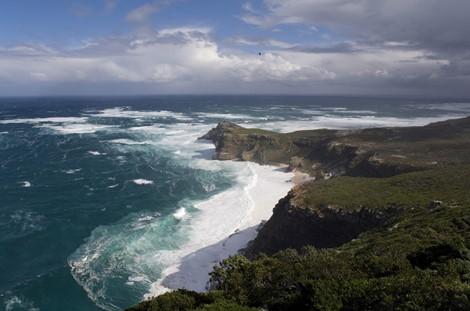At a time when global warming is driving ocean temperatures to record-setting highs and marine heat waves are striking around the globe, it might seem paradoxical that climate change could be linked to the underwater equivalent of a cold snap. But researchers now say that in some parts of the world, incidents like the 2021 cold spell appear to be getting more common as currents change, with potentially lethal consequences for marine life.

In March 2021, a grisly scene materialized on the beaches of South Africa. Giant bat-winged manta rays sprawled belly up on rocks. Hulking bull sharks lay dead in the sand. Puffer fish littered shorelines like deflated footballs. Such fish kills are usually triggered by hot water, low oxygen, or toxic algae blooms. But this time it was a surprising culprit. In the middle of the southern summer, these fish died of cold—a phenomenon that may be linked to climate change, according to a new paper.
At a time when global warming is driving ocean temperatures to record-setting highs and marine heat waves are striking around the globe, it might seem paradoxical that climate change could be linked to the underwater equivalent of a cold snap. But researchers now say that in some parts of the world, incidents like the 2021 cold spell appear to be getting more common as currents change, with potentially lethal consequences for marine life.
“This kind of a phenomenon is certainly not something that I’ve ever been aware of,” said Oregon State University marine ecologist Bruce Menge, who studies how currents shape coastal ecosystems but was not involved in the fish kill research, published today in Nature Climate Change.
The die-off in South Africa caught the attention of Australian shark researcher Nicolas Lubitz, then a Ph.D. student at James Cook University, who worked with a group of ecologists and oceanographers to piece together what happened and how it fit into broader oceanic trends. Their focus fell on the Agulhas Current, a fast-moving river of ocean water on the western edge of the Indian Ocean that sweeps southward along the coasts of Mozambique and South Africa. Normally that current brings warmer subtropical water farther south. But as it pushes up against the continental shelf, it can generate eddies, much like the revolving pools of water that form on the downstream sides of boulders in a river. As the eddy’s spin pulls water away from the coast, colder bottom water from as deep as 3 kilometers can be pulled toward the coast to replace it. Easterly winds can also push warmer surface water offshore, causing bottom water to rise.
Weather and ocean conditions converged off South Africa with chilling results starting in late February 2021. Temperature data from satellites and buoys revealed that a large southbound eddy moving through the region, coupled with 4 days of strong easterly winds, fueled strong upwelling. Ocean surface temperatures along parts of the South African coast plunged by more than 7°C in 48 hours to as cold as 10°C. At one underwater temperature tracker near Port Alfred, on South Africa’s southeastern shore, temperatures fell by more than 9°C in a single day. The upwelling covered 230 kilometers of the ocean and lasted for a week.For fish that prefer warmer waters, such as bull sharks, the cold was more than they could endure and its swift onset left them trapped, Lubitz says. “If it drops in 24 hours by 9°, that makes it pretty lethal.”
The analysis is “the first real demonstration of the presence of marine cold spells” large and intense enough to have ecosystemwide effects, says AJ Smit, a coastal ecologist at the University of the WeScientists have warned that climate change could alter upwelling zones where ocean currents border continents, in part by strengthening winds that help bring up colder water. In the case of the Agulhas Current, researchers in 2016 reported that since the 1990s its flow had grown broader and was more likely to create potent eddies.
Lubitz and colleagues went a step further, looking at 4 decades of sea surface temperature and 3 decades of wind data. They found that upwelling events at several spots in the Agulhas Current have grown more frequent and more intense, lasting longer and reaching lower temperatures. In some places, the number of upwelling events has nearly doubled, from about three per year in the 1980s to five or more per year between 2012 and 2022.
It's hard to say with certainty that the trend is driven by climate change, in part because these upwellings are so localized that they aren’t well represented in models looking at interactions between the ocean and climate, says David Schoeman, a marine climate change ecologist at the University of the Sunshine Coast who worked on the paper. But the trends are consistent with predictions of how climate change will influence these currents more broadly, and they are sustained over a long enough time that natural fluctuations don’t seem to fully explain it. The researchers also found an increase in cold upwellings at the similar Eastern Australian Current, which borders the eastern edge of Australia though the trend was less strong.
Although Menge is persuaded that the increased upwelling is real in South Africa, he suspects the distinctive geography, in which the current rounds the tip of a continent, could make it more prone to these cold upwellings. “It is certainly dramatic,” he says. “But I’m sort of inclined to think that this is closer to being unique in South Africa.”
Nonetheless, the threat from cold spells adds yet another potential way climate change might shrink shark habitat, says David Sims, a marine biologist at the United Kingdom’s Marine Biological Association and the University of Southampton who has studied the effects of heat on sharks. “It’s very worrying.”stern Cape who was not part of the study.
Sources:
SCIENCE
Provided by the IKCEST Disaster Risk Reduction Knowledge Service System
Comment list ( 0 )
